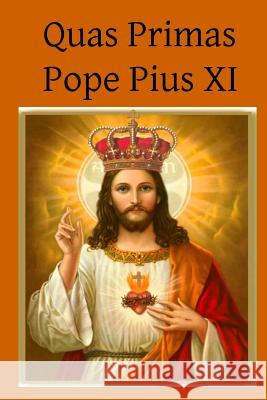Quas Primas » książka
Quas Primas
ISBN-13: 9781508849179 / Angielski / Miękka / 2015 / 38 str.
THE Encyclical of our Holy Father, Pius XI., on the Institution of the Feast of Christ Our King is a fitting crown to the devotion and the vast spiritual awakening which marked the Holy Year, 1925. In fulfilment of the commission of Our Lord to St. Peter, and aided by the light and grace that are given to every man according to his need, the Vicar of Christ addresses words of timely guidance and help to the Catholic world. We need that guidance today. In their greed for wealth, the senseless hurry of business, and the rush for pleasure men forget, then reject, Divine things. Our superficial education, the shallow science and the sensationalism of the newspapers bewilder men's minds. They cannot think steadily and soundly; they are "tossed about by every wind of doctrine." They lose Christ - not from rebellion, but from indifference. Man-made religions and scientific theories come and go like the leaves from spring to winter, and as they pass they leave men more and more confused. Outside the Catholic Church, there is no centre of spiritual authority, no institution that can claim to possess that body of truths which was the legacy of Christ to His Apostles, to be guarded by them for men through all time. There is no other infallible teacher. Man's life must be reasonable, founded on true philosophy. For very many of those who do not recognise the Divine claims of Christ there is a philosophy of life - but it is a destructive philosophy. Its authority is unstable and uncertain, that of a learning which imposes itself on the less learned. It changes as new theories are born, but always leaves greater uncertainty, as it saps the foundations of faith and drives men to religious indifference or to scepticism. Truth is put farther and farther away. Religion, then, and philosophy for such men come to be no more than a collection of words, of hazy definitions, of vague counsels of morality, with no firm foundation. Consequently, the law of sacrifice and the Christian moral code, so clearly stated in the teaching of Our Lord, are rejected, and men accept gladly those theories of conduct only which demand no moral effort and impose no burden of sacrifice. The God of the new philosophies is not real: He is not personal; He does not command. Christ for them is not the Divine Christ, who knew Himself to be God, who loved men, and lived and taught in Galilee with an authority which He claimed as Divine; who confirmed the Divine law and made laws as His own; whose praise and blame are for eternity; whose Kingdom we must enter by the way which He has appointed, through faith, baptism, sacrifice and good works.
Zawartość książki może nie spełniać oczekiwań – reklamacje nie obejmują treści, która mogła nie być redakcyjnie ani merytorycznie opracowana.











